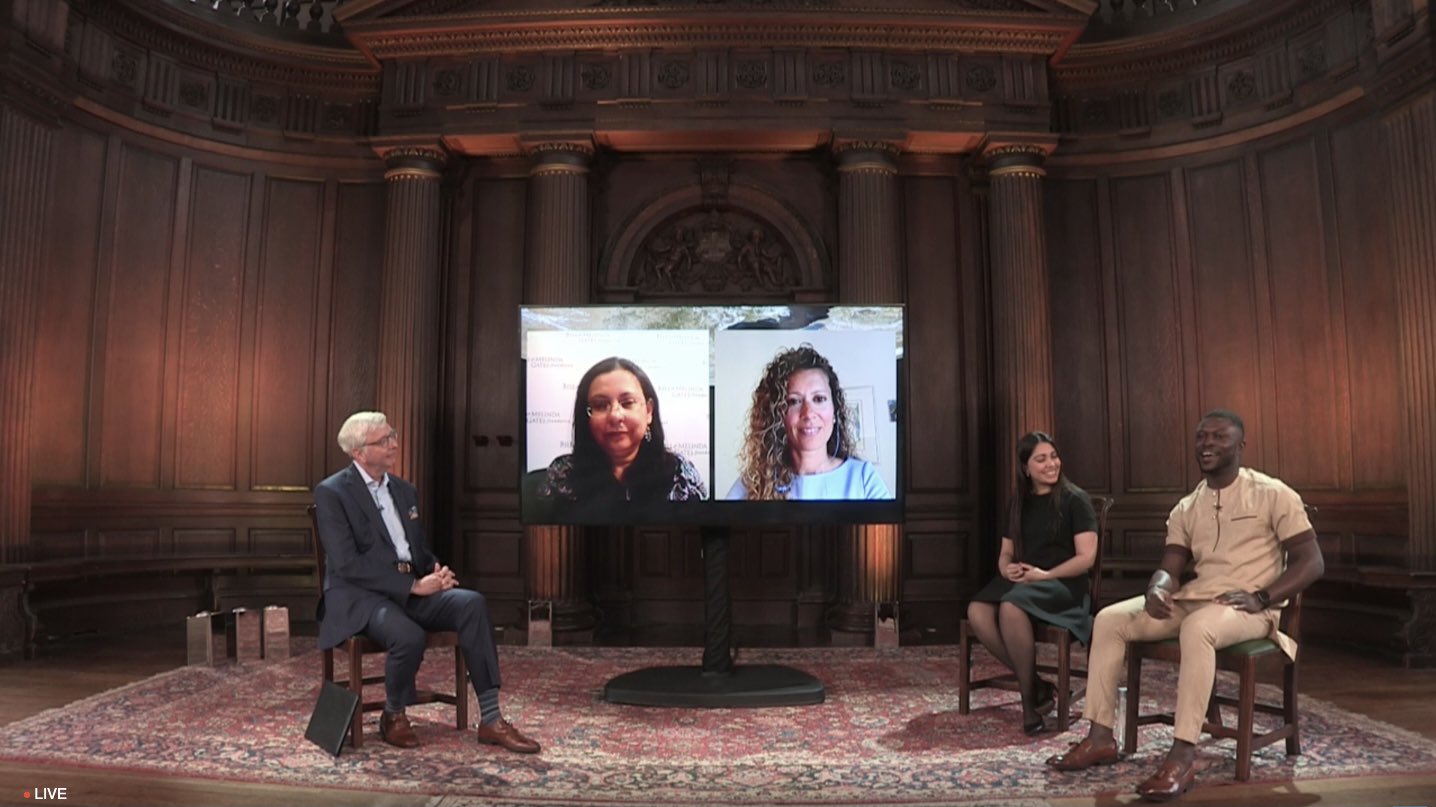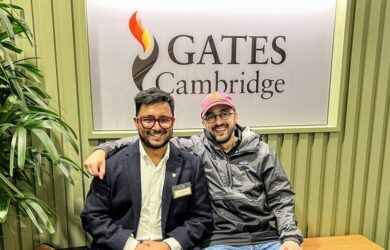
A 20th anniversary panel discussion debated how Covid-19 has affected gender equality and what can be done about it.
In gender equality work it is important to get everyone on the bus. My Gates Cambridge colleagues helped me to do that
Tara Cookson
How has Covid affected gender equality and what can we do to bridge the widening gap? On Tuesday three outstanding scholars in the area and Anita Zaidi, president of the Gates Foundation’s Gender Equality Division, spoke at Closing Gaps for Good: Ensuring Equitable Recovery in a Post-Pandemic World, a panel discussion organised to celebrate the 20th anniversary of Gates Cambridge.
Zaidi discussed the Foundation’s research into how women’s employment has been affected by the pandemic. She said Covid has “unravelled the progress women have made over the last two decades”. Before Covid, it was expected that poverty, which mainly affects women [“poverty is sexist”, stated Zaidi] would fall between 2019 and 2021. Instead it had increased by 9%, affecting around 50 million women across the world. The reasons why women have been disproportionately affected include the impact of Covid on the type of sectors they tend to work in, such as retail and tourism, and the fact that they tend to dominate in part-time and informal work, meaning they often miss out on any support if they can’t work. Moreover, many female small business owners cannot get access to loans.
Tara Cookson [2011] spoke of the fact that women have had to shoulder the majority of the unpaid care burden during Covid. This is because governments and employers do not do enough to support care work, she said. She is working on a project with UN Women and the International Labour Organization looking at how gender responsive national social protection systems are. She said that, while there is a lot of recognition of the links between gender and poverty, there is very little action to deal with the causes. She highlighted some innovative care initiatives in Capo Verde and Uruguay and called for more systems-based thinking “so that women and men can work and give and receive high quality care”.
Zaidi said childcare had to be considered part of a country’s central infrastructure “in the same way we think about roads and telecommunications”. It is cost neutral, she said, as it increases female employment both as care workers and enables them to stay in work or not to drop out of school to look after younger siblings. “It’s a triple whammy positive effect”, she said, adding that it is incredible that there has not been the necessary investment in care. She called for more work and more evidence to change decision-makers’ minds.
Equal opportunities
Shadrack Frimpong [2020] said he was inspired to co-found Cocoa 360, which provides free education for 240 girls and a healthcare centre serving eight communities in Ghana, by his cousin Grace. He said that, although he had gone on to get academic awards and to do a PhD at Cambridge, he was always third in his class at school. Grace had always outperformed him yet had not been able to have the opportunities he has benefited from. He wants to open up opportunities for girls from his region.
Frimpong said Cocoa 360 understands that health and education are linked and that, for instance, access to reproductive health services is crucial for girls. He added that he and his co-founders had assumed that men would not support the idea, but said this proved not to be true. Men have been keen to work on Cocoa 360’s cocoa farm to support the school and healthcare centre as part of a circular economy model. He added that listening to the community and working with them means they have taken ownership of the initiative.
Sharmila Parmanand [2016] spoke of her work with the Global Alliance Against Traffic in Women and also mentioned the problems of not listening to the people who are the targets of particular policies. She said sometimes anti-trafficking policies can have the opposite effect than what is intended. For instance, migrant women are given small loans when what they need is systemic protection, such as access to healthcare; sex workers are given sewing machines when they would prefer support to be able to unionise and advocate for themselves as well as protection from police violence.
She said Covid has exposed the precarity of many low wage migrant workers who often do not have access to welfare and risk being sent home. A more equal recovery is needed, she said, and not a return to the old ‘normal’.
Cookson also spoke about increased domestic violence against women during the pandemic. Her organisation Ladysmith and USAID have funded the Cosas de Mujeres project which has been been working on the Venezuela/Colombia border and uses Whatsapp to connect women with the services they need and mines that data to improve the services that they are offered and ensure they respond to genuine need, for instance, there has been an increase in requests for cash transfers, women’s shelters and sexual and reproductive health services.
The need for data
Data, said Cookson, has often been so narrowly defined that it doesn’t include women’s lived experiences. Her PhD research on conditional cash transfers showed, for instance, that official data missed the reality of women having to walk hours to health clinics with their children, only to find they were closed. Her co-founder at Ladysmith has investigated the lack of femicide data about women from ‘the wrong neighbourhoods’. She also mentioned a feminist agricultural group in Brazil which is helping to give a more accurate picture of women’s labour on family farms.
Zaidi agreed that there is a need for more research into women’s health needs and said the National Institutes of Health in the US spent only 1% of its budget on this.
Frimpong said gathering solid evidence to support Cocoa 360’s work was why he was doing his PhD at Cambridge. Sharmila said her Gates Cambridge Scholarship was supporting her in-depth, immersive study of a feminist participatory research project in the Philippines.
The panel discussed female leadership. Zaidi said women leaders who listen have shown how effective they can be in the pandemic, whether in Kerala, British Columbia, Germany, Finland, Denmark or New Zealand. Women have also been leaders in the search for a vaccine and in global healthcare, accounting for 70% of the global healthcare workforce [although not in many of the top 5% of senior leadership positions]. She spoke of a global health programme, WomenLift Health, which aims to help mid-career women in health have the skills to advance and overcome structural barriers.
Asked if they are optimistic about the future, the panellists were positive. Parmanand said Covid has exposed social inequalities to such an extent that no-one can deny they exist and that these had been picked up in a way they had not been before. “It has created traction and women have been at the forefront of mobilisations. I hope we will realise that we cannot dismiss women’s demands.”
Frimpong said men are waking up to the reality of women’s potential and Cookson said the care economy is being much more widely debated. Zaidi highlighted the forthcoming Generation Equality Forum in the summer which will look at ways to progress gender equality in the light of the 2030 Sustainable Development Goals. It includes concrete themes such as closing the digital divide, female leadership and economic justice and rights.
Improving the lives of others
The discussion was preceded by an interview with Professor Barry Everitt, Provost of the Gates Cambridge Trust, who said the scholarship had been inspired by Bill Gates Sr. who defined the parameters of what makes a Gates Cambridge Scholar: exceptional academic performance, leadership capacity and a commitment to improving the lives of others.
He said the scholarship offered a range of benefits, including family support, as well as access to a “network of brilliant minds” and “a vibrant, diverse community dedicated to improving the lives of others”. Every year around 6,000 people apply for around 80 places. He said there are a great many supremely qualified applicants whom the Trust cannot fund so it would be wonderful to offer more scholarships – and, despite scholars coming from 111 countries to date, the Trust is keen to offer scholarships to even more talented applicants from African countries, South America, The Caribbean and the Middle East.
Cookson stated: “Gates Cambridge prepared me to have challenging, solutions-oriented conversations with people who had different views to me, to approach issues with empathy and enabled me to have influence in places I would not have had. In gender equality work it is important to get everyone on the bus. My Gates Cambridge colleagues helped me to do that.”
Parmanand added: “Gates Cambridge gave me an opportunity for public engagement and to interact with many different audiences. It has been life-changing.”












